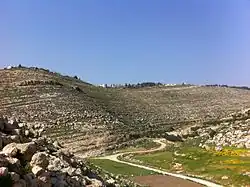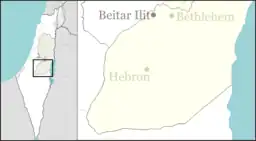Adora
אֲדוֹרָה | |
|---|---|
| Hebrew transcription(s) | |
| • unofficial | Adorah |
 | |
 Adora | |
| Coordinates: 31°33′08″N 35°01′08″E / 31.55222°N 35.01889°E | |
| District | Judea and Samaria Area |
| Council | Har Hevron |
| Region | Judaean Mountains |
| Affiliation | Mishkei Herut Beitar |
| Founded | 1982/1984 |
| Population (2021) | 474[1] |
Adora (Hebrew: אֲדוֹרָה) is an Israeli settlement organised as a community settlement in the Judean Mountains in the southern West Bank, northwest of Hebron. Established in 1984, the community ideologically identifies with the Herut–Betar farming organization and falls under the jurisdiction of Har Hevron Regional Council. Under the terms of the Oslo Accords of 1993 between Israel and the Palestine Liberation Organization, Adora was designated Area "C" under full Israeli civil and security control.[2] In 2021 its population was 474.
The international community considers Israeli settlements in the West Bank illegal under international law, but the Israeli government disputes this.[3]
Etymology
Adora is named after the biblical town Adoraim mentioned in 2 Chronicles 11:9, one of the fortified cities of the ancient Kingdom of Judah under the rule of Rehoboam. The name of the Palestinian town of Dura, located four kilometers south of Adura, is also derived from the ancient Adurim.
History
Adora was established in 1982 as a Nahal para-military outpost and demilitarized two years later when handed over to civilians.[4] In 1983, a core group of families from Kiryat Arba, Beit Shemesh, Kiryat Gat, and Or Akiva, joined one another in preparing to settle the barren hilltop. After a week of preparations at the Faculty of Agriculture in Rehovot, about half the families of the original 23 were told to be ready to move into trailers to be installed at the site with the government's permission. In January 1984, the group was warned that another core group might occupy the trailers before them. On 11 and 12 January 1984, the group moved in and began a wave of settlement expansion in the region.[5]
Adora is situated east of the Israeli West Bank barrier, 6.4 kilometers from the Green line in the Judean hills northwest of Hebron at an altitude of 692 metres (2270 feet). The settlement has a total area of about 360 square meters.[6] According to a 2006 Peace Now-report, 36.01 percent of the land Adora is built on, is privately owned, all or most of it by Palestinians.[7] According to Israeli law, settlements on privately owned Palestinian land are illegal.[8] According to ARIJ, Israel confiscated about 1000 dunams of land from the nearby Palestinian town of Tarqumiyah in order to construct Adora.[9]
Israeli-Palestinian Conflict
In the 27 April 2002 Adora terrorist attack, three Palestinian gunmen dressed like Israeli soldiers infiltrated the settlement of Adora on a Sabbath morning and attacked and killed four residents, including a 5-year-old girl, and injured seven. One of the assailants was later killed by the IDF.[10]
References
- ↑ "Regional Statistics". Israel Central Bureau of Statistics. Retrieved 22 February 2023.
- ↑ "LAND GRAB. Israel's Settlement Policy in the West Bank" (PDF). B'Tselem. May 2002. p. 111.
- ↑ "The Geneva Convention". BBC News. 10 December 2009. Retrieved 27 November 2010.
- ↑ "Israel: 'Secret' Defense Ministry Database Reveals Full Settlement Construction" (PDF). Open Source Center. 30 January 2009. Retrieved 14 March 2013.
- ↑ Hoberman, Haggai (2008). Keneged Kol HaSikuim [Against All Odds] (in Hebrew) (1st ed.). Sifriat Netzaim.
- ↑ "Settlements list". Peace Now. Archived from the original on 18 July 2011. Retrieved 23 November 2011.
- ↑ In the data provided by the Civil Administration "there is no mention of whether the private land is owned by Palestinians or by Jews... Nevertheless, it is highly probable that most of the land that is marked here as private land (if not all of it) is privately-owned Palestinian land"."Settlement are built on Private Palestinian Land". Peace Now. 14 March 2007. Retrieved 29 March 2011.
- ↑ "G U I L T Y! Construction of Settlements upon Private Land – Official Data". Peace Now. 2006. Archived from the original (PDF) on 4 March 2016. Retrieved 1 April 2011.
- ↑ Tarqumiya Town Profile, ARIJ, p. 15
- ↑ Bennet, James (28 April 2002). "Mideast Turmoil: The Attack; Arabs in Disguise Kill four Settlers in the West Bank". The New York Times. Retrieved 14 March 2013.